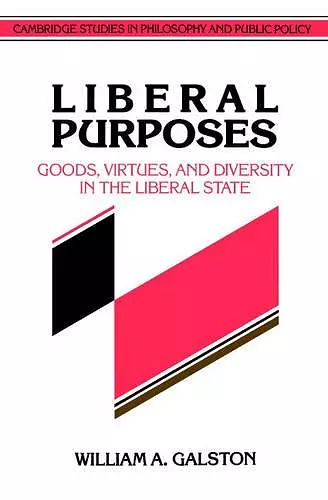Liberal Purposes
Goods, Virtues, and Diversity in the Liberal State
Format:Paperback
Publisher:Cambridge University Press
Published:30th Aug '91
Currently unavailable, and unfortunately no date known when it will be back

This book is a major contribution to the current theory of liberalism by an eminent political theorist. It challenges the views of such theorists as Rawls, Dworkin, and Ackerman who believe that the essence of liberalism is that it should remain neutral concerning different ways of life and individual conceptions of what is good or valuable. Professor Galston argues that the modern liberal state is committed to a distinctive conception of the human good, and to that end has developed characteristic institutions and practices - representative governments, diverse societies, market economies, and zones of private action - in the pursuit of specific public purposes that give unity to the liberal state. These purposes guide liberal public policy, shape liberal justice, require the practice of liberal virtues, and rest on a liberal public culture. Consequently the diversity characteristic of liberal societies is limited by their institutional, personal, and cultural preconditions.
"...it is both a clear and up-to-date attack on the proceduralist experiment and a new and sympathetic outline of the value commitments that are actually presupposed by the core positions of liberal political morality." Political Theory
"Liberal Purposes is a thoughtful, challenging, and clearly written critique of the dominant strand in contemporary liberalism written from within the liberal tradition itself." Choice
"As Galston's latest, best effort at liberal reparation, this work deserves the attention of those political and social theorists familiar with the contemporary discussion of liberalism in the writings of such prominent scholars as John Rawls, Ronald Dworkin, Alasdair MacIntyre, Michael Walzer, Roberto Unger, and Judith Shklar, not to mention many best known within political philosophy....Galston extends and deepens the current debates on liberal theory in a way that sociologists may find challenging and therefore helpful in rethinking their own theoretical analyses." Alan Woolfolk, Contemporary Sociology
"This is an important book, which addresses many of the central issues in liberal theory: the debate between foundationalists and nonfoundationalists, liberals and communitarians, neutralist liberals and non-neutralist liberals, and among diverse conceptions of equality. It is also refreshing in that it deals with the appropriate liberal response to pressing public policy issues, such as health care policy, education, distributive justice, and the treatment of nonliberal minorities." Margaret Moore, The Review of Politics
ISBN: 9780521422505
Dimensions: 230mm x 153mm x 26mm
Weight: 527g
356 pages